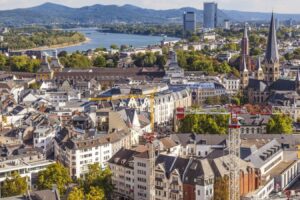TEXT: Sibel BÜLAY
In recent meetings i have noticed the call for a change in mindset regarding climate change. I noticed this at ICLEI’s Daring Cities, and Dennis Pamlin spoke of it at this session of the Multilevel Action Pavilion. At Daring Cities, many spoke of the need to stop trying to decarbonize the western lifestyle. This lifestyle has created environmental degradation, the climate crisis and biodiversity loss. And resulted in economic inequality and climate injustice, as those with the lowest contribution to GHG emissions are exposed to extreme weather events, such as the flooding in Pakistan and typhoons in the Philippines. I attend an event that were organized by ICLEI.
Among the speakers were Dennis Pamlin, Executive Director of The Net-Zero Compatibility Initiative, Luis Donaldo Colosio Riojas, Lord Mayor, City of Monterrey, Mexico, Marília Carvalho de Melo, Secretary of Environment for Minas Gerais State, Brazil, Seth Schultz, Chief Executive Officer, Resilience Rising, Giorgia Rambelli, Director of Urban Transitions Mission and Toby Heaps, Chief Executive Officer of Corporate Knights.
Pamlin says that for many of us, “our mindset is stuck in the 90s: Focused on emissions reduction in the rich world, addressing the big polluters.” Stop focusing on making the old fossil-free. Instead Pamlin calls on us to focus on the human need and develop innovative solutions that both meet the need and avoid emissions altogether. This can be a tech solution, such as online meetings; or as simple as walking.
Cities are moving in the right direction, but not with the right toolset. Cities should understand the sources of emissions but not focus on existing sectors. Focusing on sectors and emissions reduction results in optimizing and urban transformation. The goal is 11 billion people living flourishing lives.
Luis Donaldo Colosio Riojas state that national governments will never achieve NDCs without cities because 70% of all emissions are from cities. Localization of the NDCs is a must. The challenge is getting subnatıonal governments the technical and economic help they need. Climate change is no longer abstract problem.
Marília Carvalho stressed that innovation must be focused on local priorities, especially focused on local social and economic conditions. Applying innovation to reality is when solutions work best. Public Policy must be science-based.
Seth Schultz said that a review of the research agenda shows a massive gap in understanding cities. There is a need to fill in those research gaps. Companies have massive amounts of data which can be used for this purpose, but they are not incentivized to put them in the public domain or make them available to researchers. Indigenous communities have massive amounts of data, a deep understanding of the land and changes happening around them. Resilience Rising, community of NGOS focused on resilience, is looking to create a new type of COP, Community of Practice.
On the other hand Giorgia Rambelli stressed that cities and local governments are in the front lines of climate crises. Therefore they are also where solutions are developed and delivered.
UTM is working on providing a framework for city actions; for sharing what they are doing and for collaborating.
İdentifying the gaps in urban knowledge and how best to fill them in. Developing a global innovation alliance with a statement of needs around urban transition and needs around innovation. Must understand the needs of cities aligning climate policy across the board throughout different levels of government. National governments should devote at least 1/3 of the entire innovation budget to cities. This is a clear ask, to support innovation on the ground.





